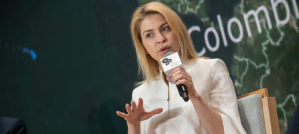Yalta meeting has to become a conference of unification - Clinton
William Clinton, 42nd president of US, spoke on 4th annual meeting of Yalta European Strategy (YES). Speech was pivoted around modern world full of inequality and threats, social problems, that reached such a great scale that put in the shade all discrepancies and contradictions between separate states.
In the opinion of president Clinton agenda of the day makes interdependency. "It means that we cannot shut ourselves off. We depend on one another."
Clinton thinks that Yalta European strategy is a bright example of a global tendency to deepening of interdependency in the world and it says about integration. About unification. "Why are we here today? Because you do not want to get to the situation after the first Yalta conference (1945) when peoples were separated. We need to move to more interdependent world. It has to be more integrated. Community, town, sports team, family - it is an important symbol not only for the people of Ukraine and you all but also for the entire world because entire world has to be involved".
President Clinton emphasized that it is not an easy task. "We have very complex identities. Still we will move from disintegrated to integrated society. We want security policy that allows to have more friends than foes. We need progress in our homeland. Because one is judged by what one has at one's home. When folks do not feel comfortable and secure at home they are afraid of alliances, unions, are afraid to accede to anything. We have to think about it and to influence the way coming generations think about it".
President Clinton noted that we have to learn ourselves and teach our children "to play games where win all, not someone". And this approach has to be followed through in every domain including international policy. "Discrepancies are good. We have to learn games where two parties win. And Ukraine is confident on its way to that".
Making a flashback to the 1945 Yalta meeting that resulted in division of Europe between two opposing camps president Clinton said current Yalta meeting has to become a meeting of unification. "Yalta European Strategy has a great abbreviation. YES - is affirmative: affirmative to integration with Europe, affirmative to the partnership with Russia, affirmative to cooperation of the three countries with the US, affirmative to finding solution advantageous to all. Certainly, we have a lot of problems in mutual relations. Even if we get them over we still will have problems before us - from climate changes to tuberculosis, malaria and AIDS. We have to think not about that which separates us but that which unites us. Once we were separated and paid a great price for that. I want this Yalta meeting to be remembered as a conference of unification".
YES is an independent organization, which brings together high-level participants in Ukraine, and internationally: policy-makers, business leaders, thinkers, researchers and journalists. The annual YES summits in Yalta have become the leading informal high-level forum focused on discussing and development of political recommendations. In 2006, the YES experts developed an analytical document "Agenda-2020", representing a step-by-step strategy for Ukraine's accession to the European Union in 2020. YES was created at the initiative of a Ukrainian businessman and public figure, Victor Pinchuk in spring 2004.
←Back to news list

